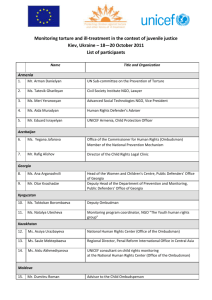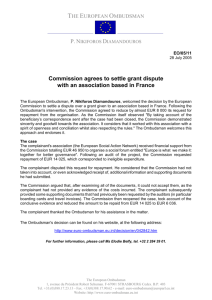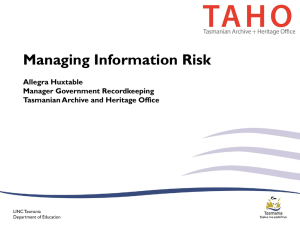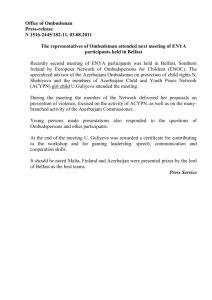DOC - Office of the Ombudsman
advertisement
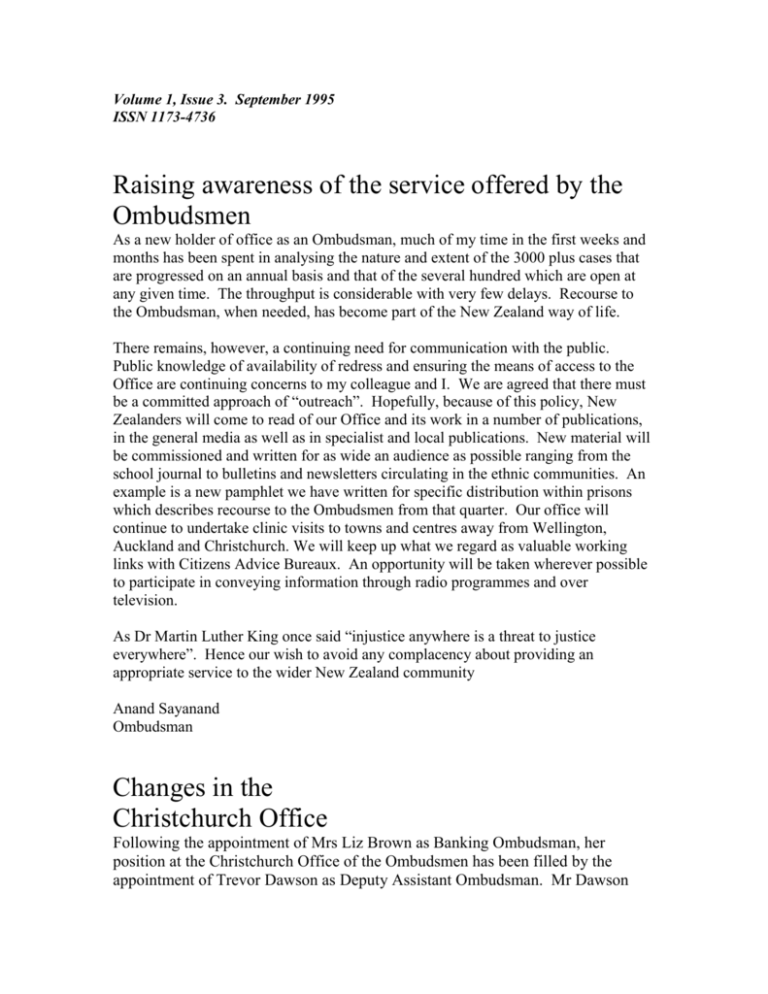
Volume 1, Issue 3. September 1995 ISSN 1173-4736 Raising awareness of the service offered by the Ombudsmen As a new holder of office as an Ombudsman, much of my time in the first weeks and months has been spent in analysing the nature and extent of the 3000 plus cases that are progressed on an annual basis and that of the several hundred which are open at any given time. The throughput is considerable with very few delays. Recourse to the Ombudsman, when needed, has become part of the New Zealand way of life. There remains, however, a continuing need for communication with the public. Public knowledge of availability of redress and ensuring the means of access to the Office are continuing concerns to my colleague and I. We are agreed that there must be a committed approach of “outreach”. Hopefully, because of this policy, New Zealanders will come to read of our Office and its work in a number of publications, in the general media as well as in specialist and local publications. New material will be commissioned and written for as wide an audience as possible ranging from the school journal to bulletins and newsletters circulating in the ethnic communities. An example is a new pamphlet we have written for specific distribution within prisons which describes recourse to the Ombudsmen from that quarter. Our office will continue to undertake clinic visits to towns and centres away from Wellington, Auckland and Christchurch. We will keep up what we regard as valuable working links with Citizens Advice Bureaux. An opportunity will be taken wherever possible to participate in conveying information through radio programmes and over television. As Dr Martin Luther King once said “injustice anywhere is a threat to justice everywhere”. Hence our wish to avoid any complacency about providing an appropriate service to the wider New Zealand community Anand Sayanand Ombudsman Changes in the Christchurch Office Following the appointment of Mrs Liz Brown as Banking Ombudsman, her position at the Christchurch Office of the Ombudsmen has been filled by the appointment of Trevor Dawson as Deputy Assistant Ombudsman. Mr Dawson was for several years the Senior Investigating Officer in the Christchurch Office, but during the past three years he was Deputy Ombudsman in the Office of the Queensland State Ombudsman. From 1 October 1995, the Christchurch Office will shift to level 6 in Forsyth Barr House, 764 Colombo Street, Christchurch. The postal address, telephone and facsimile numbers will remain unchanged. Should the names or salaries of public officials be made available? Sir Brian Elwood, the Chief Ombudsman, addressed these two significant privacy issues for the public service in his speech for the Privacy Issues Forum organised by the Office of the Privacy Commissioner. His approach to these two issues is summarised below. In each case, the approach under the Official Information Act (or the Local Government Official Information and Meetings Act) involves ascertaining the weight of the privacy interest (see section 9(2)(a) OIA, section 7(2)(a) LGOIMA) and then balancing that against any public interest considerations which favour release (see section 9(1) OIA, section 7(1) LGO1MA). Availability of the names of officials While the name of an official in one sense personal information about them, disclosure of a name in the context of their position in the public sector will not unduly or unreasonably infringe upon the official’s privacy. It should be accepted that when a person enters employment in the public sector chat person will be likely to have dealings with members of the public. The public interest will not be well served by making an assumption, on the grounds of the privacy of the public official concerned, in favour of anonymous public officials. Accordingly, as a general proposition, a person working in the public sector in direct or indirect contact with the public can assume that for reasons of accountability their name should be identified upon request. There may of course be exceptions especially where the relationship between the citizen and the public sector organisation or official concerned is unreasonably strained. In such circumstances consideration should be given to withholding of the identity of the public official concerned for the reason of protecting such officials from improper pressure or harassment (see section 9(2)(g)(ii) OIA, section 7(2)(f)(1i) LGOIMA). Salary information The natural reaction of the holder of the information is that the privacy of the person is paramount and that the withholding of the information is necessary to protect the individual’s privacy. On the face of it that could be the end of the matter. However, significant weight must be given to the public policy objective promoting the accountability of the public sector. Although each case must be considered individually, the competing public policy objectives favouring privacy and accountability must be weighed both by the holder of the information and an Ombudsman on review. A general approach which may provide a helpful guideline is as follows: 1. The salary of the chief executive or other head of a public sector organisation should be known, according greater weight to accountability than to privacy; 2. Subject to consideration of the individual factors involved, salaries of second tier management, especially where that management has responsibility for the provision of services to the public and interfaces with the public, should be disclosed in financial bands. This will generally meet accountability requirements whilst preserving a significant degree of privacy. 3. Generally all other salaries should remain private, according privacy interests higher weighting than accountability interests. The accountability at this level may best be achieved by the identification of the cost of a particular service provision, which is clearly an accountability issue. Again there may be exceptions where for instance identification of a service cost might likely identify the salaries of those directly responsible for the service. Natural justice at issue One of the principles of natural justice is that if anything critical is said concerning another person, that person should have the right to know of that criticism and have an opportunity to put their case. In a recent case, the Ombudsman was asked to investigate and review the refusal of the Transport Accident Investigation Commission (TAIC) to release the comments made by interested parties on a preliminary report into a helicopter crash. This raised the issue of whether the comments should be released to comply with this principle of natural justice. The TAIC investigates transport accidents to determine the causes of such accidents with a view to avoiding similar accidents in future. When investigating accidents, the procedure of the TAIC is to write a preliminary report and circulate this to “interested parties” for their comments. These comments are then considered before writing a final report for publication. The comments included both personal information about the requester (which has to be considered under the Privacy Act) and other information (which is considered under the Official Information Act). The TAIC refused to release the comments and the requester appealed to the Privacy Commissioner (in relation to the personal information about him) and to the Ombudsman (in relation to the other information). The Ombudsman formed the view that the submissions were supplied in confidence and that if they were released it could lead to information no longer being openly disclosed to investigators. This is a reason for withholding information under the Official Information Act (see section 9(2)(b)(a)(i)). However, before information can be withheld, the Ombudsman must also be satisfied that there are no public interest considerations favouring release of the information which outweigh the interest in withholding (see section 9(1)). It was at this point that the Ombudsman considered whether natural justice required that the submissions be released. The requester considered that natural justice included the opportunity to correct any misinformation that might be present in the submissions. However, the Ombudsman formed the view, following a Privy Council case (Public Disclosure Commission v Isaacs [19891 1 All ER 137), that natural Justice in this case did not require that one interested parry’s submissions should be revealed to another interested party. Accordingly, the public interest in release did not outweigh the interest in withholding and under the Official Information Act there was good reason to withhold the submissions. Why didn’t I…? Why did I get turned down for a benefit? Why didn’t I get the job? Why didn’t my company get the contract? Public sector agencies make many decisions which affect individuals and groups. Section 23 of the Official Information Act (section 22 of the Local Government Official Information and Meetings Act) provides that every person has a right to a written statement of reasons for any decision or recommendation made by a public sector agency which affects that person. In some cases public sector agencies respond with cliches such as “you weren’t the best person for the job” or “you didn’t meet the criteria”. The use of such vague expressions is not enough to satisfy the requirements of section 23. A common issue for employers is how to explain that the person appointed to the position was better qualified or more experienced without infringing the privacy of the successful applicant. (from overleaf) The Ombudsmen have found that a summary of the qualifications and experience of the successful applicant can be disclosed in a manner that does not infringe the privacy of the successful applicant. For example, a list of academic qualifications and a brief description of relevant experience will disclose only general information which is often a matter of public record and known to a significant number of people. It is good practice to ask the successful applicant for their views on disclosure of such a summary. In the Ombudsmen’s experience, there have not been any strong objections to disclosure. In a recent case, the Ombudsman was asked to review a statement of reasons under section 23. Below the statements “before” and “after” the Ombudsman’s intervention are compared. Before A polytechnic told an unsuccessful applicant that she had not been appointed to the position because the person who was appointed to the position “more fully meets our requirements” as measured against the job description. After Following consultation with the successful applicant who expressed no objection, the polytechnic said that: * the successful applicant had a greater familiarity and knowledge of the computerised system which was an integral part of the position; * the successful applicant could speak Maori -this was important because of the multicultural composition of the polytechnic’s students, with the move into degree courses, the successful applicant’s higher qualification was essential. Questions & Answers Q. What must the section 23 statement of reasons cover? A. The statement must cover: the findings on material issues of fact a reference to the information on which the based the reasons for the decision or recommendation findings were Q. Are there any reasons for withholding information from a section 23 statement of reasons? A. Information may be withheld for a limited number of reasons, e.g. prejudice to the security or defence of New Zealand, prejudice to the maintenance of the law. In addition, a reference to the information on which the findings were based need not be given if it would breach a promise to keep evaluative material (such as an employment reference) confidential. Q. What will the Ombudsman do when reviewing a statement of reasons? A. The Ombudsman will seek to establish the factors which the decision-maker took into account in reaching the decision or recommendation at issue. Having done that, the Ombudsman forms a view as to whether the statement of reasons provides an accurate reflection of the factors taken into account in reaching the decision. The Ombudsman does not assess the merits of the decision or recommendation itself when undertaking an investigation under section 23. Q. What if the person thinks that the decision was unreasonable? A. If a person does think that the decision is unreasonable, then he or she may ask the Ombudsman to undertake an investigation under the Ombudsmen Act and form an opinion on the reasonableness of the decision. For more information on the application of section 23 please phone the Wellington Office of the Ombudsmen on (04) 473-9533. The Office has Practice Guidelines on section 23 which can be sent out to you. Alternatively, one of the investigating officers will be happy to talk to you should you have a specific query.



